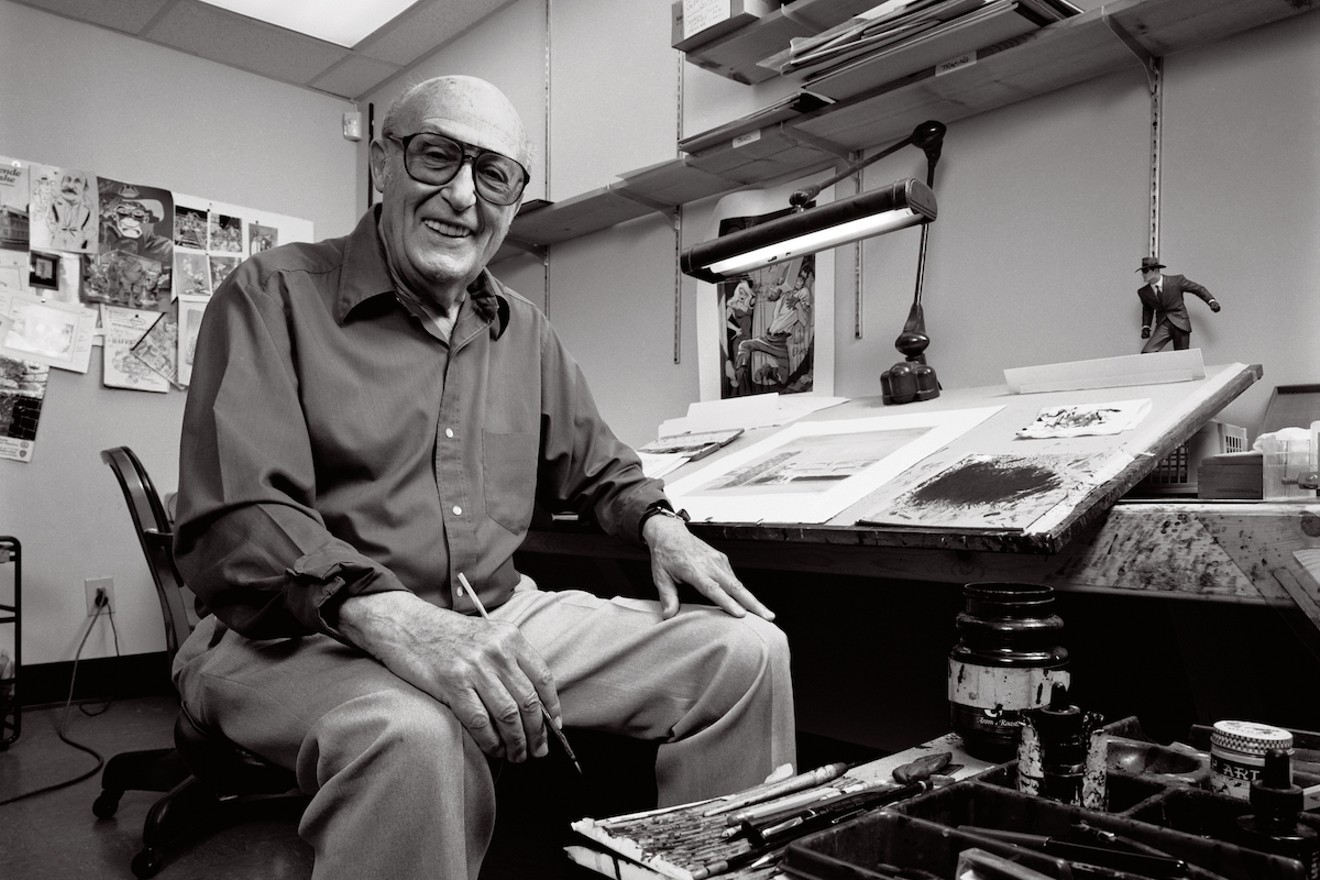If that fact intrigues you, take advantage of the Jewish Museum of Florida-FIU's free exhibition celebrating Eisner's art. On display through August, "Will Eisner: Comic Creator, Illustrator, and Innovator" fills an entire wing of the South Beach museum with original artwork from the master, who died in 2005 at the age of 87, over the course of his six-decade career.
"Will Eisner doesn't get enough credit. Everyone knows Stan Lee, but not enough people know Will Eisner's name," explains museum curator Jacqueline Goldstein.
As a longtime comic book aficionado, Goldstein knew Eisner's family lived in South Florida. On a lark, she reached out to see if they might be interested in exposing his creations to a new audience.
"I got to work directly with them going through their collection, and we're now able to show his work in progress," she says.
Eisner is best known for his 1940s crimefighter comic strip The Spirit. Modern audiences are probably more familiar with the mediocre 2008 movie adaptation starring Scarlett Johansson and Samuel L. Jackson, which portrayed the titular character as fairly generic. The actual The Spirit comics were groundbreaking, from how Eisner played around with displaying the title in each chapter to the film noirish setting.
The Spirit is represented in the museum's exhibition with all seven original pages from a comic published in newspapers on September 5, 1948, "The Story of Gerhard Shnobble."
"It was supposedly Eisner's favorite," Goldstein says. "It was about a guy who could fly, and nobody ever believed him. One day he flew, and nobody noticed because they were too busy watching the Spirit fight bank robbers."

Will Eisner is best known for his 1940s crimefighter comic strip The Spirit.
Photo courtesy of the Jewish Museum of Florida-FIU
You can see the tape marks from where the paper was attached to the artist's drawing board. You can see the thought that went into where the text should go on the page," Goldstein adds.
A large part of "Will Eisner" is dedicated to the illustrator's later work, which grew too sophisticated to fit into the template of what most people considered to be a comic book.
And so the graphic novel was born.
Eisner mined his own life for inspiration in some of his most acclaimed graphic novels, from the tough times his family went through in Depression-era New York City to his eventual move to South Florida in the 1980s as a semi-retiree. Whether exploring love, regret, or greed, books like A Contract with God and The Building captured the human psyche from all angles.
One of his later works represented in the exhibition, 2003's Fagin the Jew, directly responded to one of Eisner's greatest artistic regrets. In the 1940s, he created Ebony, a ridiculously large-lipped, jive-talking African-American caricature, to serve as the Spirit's sidekick. As someone who was hurt by anti-Semitism as a kid, Eisner knew firsthand how hurtful negative stereotypes in popular culture could be to minorities and kicked himself for not realizing the impact his creations could have. With Fagin the Jew, Eisner imagined how a Jewish stereotype in Oliver Twist would defend himself to his creator, Charles Dickens.
While the pandemic forced the museum to scuttle some of the planned festivities around the Eisner exhibition, there was a bright side: The staff created a 3-D model of the gallery available for viewing on the museum's website and offered virtual tours to comics fans around the world.
As of April, the Jewish Museum of Florida began accepting in-person visitors. So now everyone can see for themselves how far the boundaries of comics can be pushed.
"Will Eisner: Comic Creator, Illustrator, and Innovator." On view at the Jewish Museum of Florida-FIU, 301 Washington Ave., Miami Beach; 305-672-5044; jmof.fiu.org. Admission is free.












